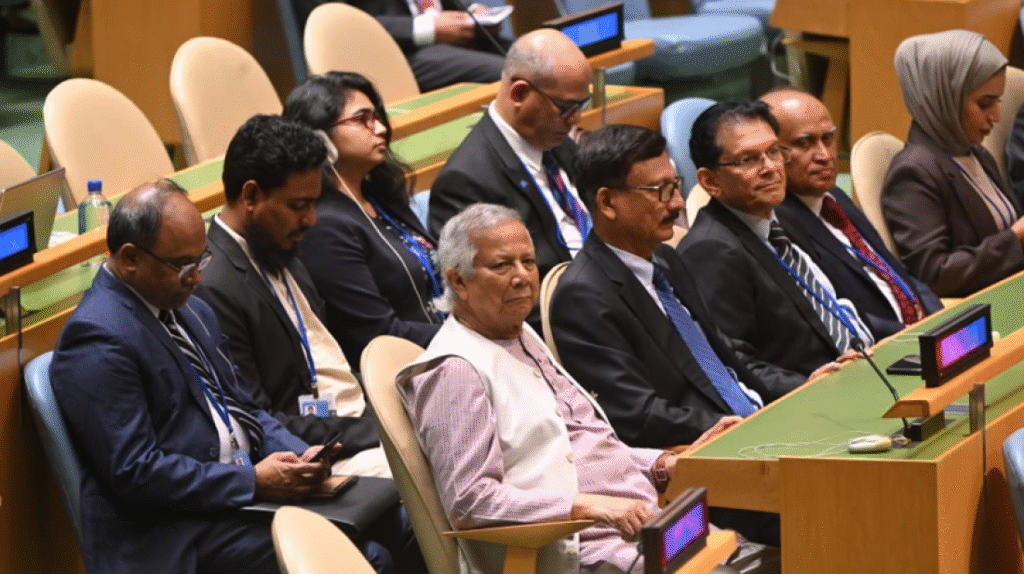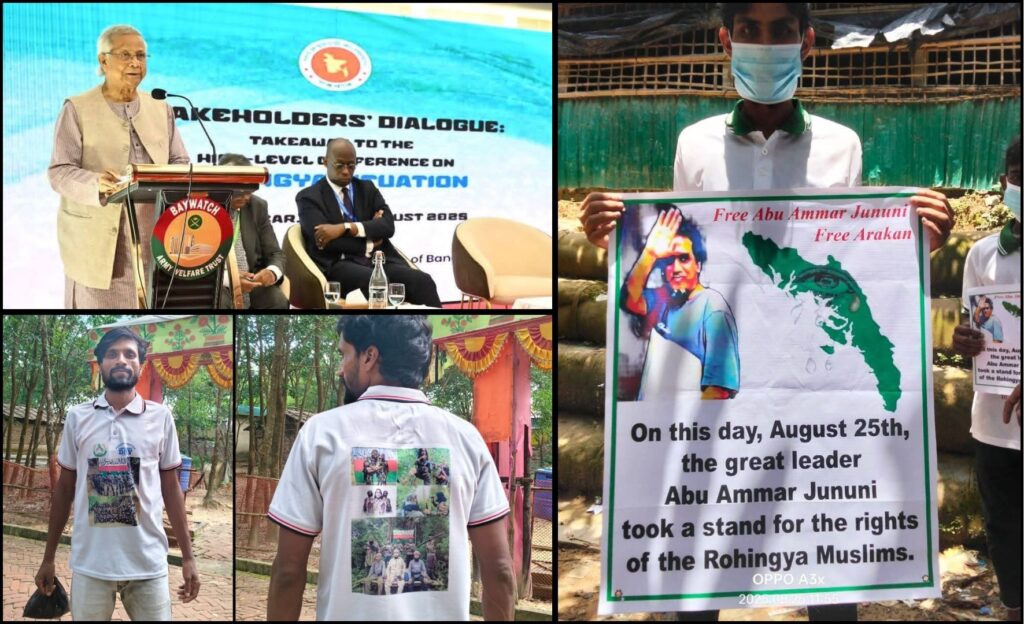The annual United Nations General Assembly (UNGA) once again passed with lofty speeches about war, climate change, human rights, and global security. Yet one of the most acute humanitarian tragedies of our time-the plight of the Rohingya-was relegated to the margins, barely mentioned beyond the predictable symbolic statements.
More than seven years after the Myanmar military unleashed a genocidal campaign that forced nearly a million Rohingya into Bangladesh, the international community has allowed their suffering to fade into the background, normalised by indifference and fatigue, according to a report of the prominent news outlet the Weekly Blitz.

The tragedy today is not only that the Rohingya are suffering, but that their suffering has been rendered invisible in the eyes of global leaders. Since 2017, when Myanmar’s Tatmadaw carried out mass killings, rape, and the torching of entire villages, the world’s response has largely been confined to strong words, investigations, and legal proceedings. The United States formally determined that the atrocities amounted to genocide. The International Court of Justice (ICJ) began hearings. The United Nations issued report after report cataloguing abuses. Yet the material conditions of the Rohingya remain unchanged: they are stateless, confined to camps, and stripped of any prospect of returning home safely.
This year’s UNGA could have been a turning point. The political landscape in Myanmar has shifted dramatically since the military coup of 2021. The Arakan Army (AA), a powerful ethnic armed group, now controls 11 of Rakhine State’s 18 townships-the heartland of the Rohingya people. For decades, the Myanmar state dictated the fate of the Rohingya through repression, restrictive laws, and denial of citizenship. With the AA’s territorial ascendancy, there is an opening for new political arrangements.
But this opening carries as much risk as promise. If the Rohingya are excluded from whatever settlement emerges in Rakhine, they could face yet another cycle of marginalisation, this time under a new power broker rather than the military junta. The UNGA should have grappled with this reality, yet in New York, the issue was conspicuously absent. Leaders spoke vaguely of Myanmar’s civil war but rarely addressed the Rohingya directly. Bangladesh, which shoulders the burden of hosting almost a million refugees in Cox’s Bazar, repeated its ritual call for repatriation. These annual pleas have become little more than rhetorical exercises, disconnected from the actual balance of power on the ground in Myanmar. Talking about repatriation without engaging with the actors who now control Rakhine is political theatre, not a plan.
ARSA jihadists terrorise Rohingya Christians under UN watch in Cox’s Bazar
Death of TTP fighter Foisal Hossain in Pakistan raises serious concern
Rohingya Conference: Yunus out to destroy Bangladesh in new international plot
Meanwhile, the situation in Bangladesh is becoming increasingly unsustainable. International aid for Rohingya refugees has plummeted due to donor fatigue and shifting global priorities. Food rations have been cut, malnutrition is rising, and despair is spreading among young people who see no future beyond the fences of Cox’s Bazar. Once hailed as a symbol of humanitarian compassion, the world’s largest refugee settlement is now teetering on the brink of crisis.
The consequences are alarming. With little education or economic opportunity, and with dwindling hope of return, the camps risk becoming breeding grounds for crime, human trafficking, and radicalisation. This is not only a humanitarian emergency but a looming security threat for Bangladesh and the wider region. The UNGA could have sounded the alarm, mobilised fresh funding, and pushed for innovative solutions. Instead, the international community looked away.
The neglect of the Rohingya is not merely a moral failure; it is a strategic blunder. Regional stability is at stake. A destabilised Rakhine State, combined with growing unrest in the refugee camps, risks sparking cross-border instability. Bangladesh, already under strain and in the midst of a political transition under an interim government, cannot bear this burden indefinitely.
At the same time, Myanmar’s neighbours have their own stakes in Rakhine. India views the state as a strategic corridor for its “Act East” policy, while China has invested heavily in ports and energy pipelines linking the Bay of Bengal to Yunnan. If the international community abdicates its role, regional powers will shape outcomes according to their interests, not the rights or dignity of the Rohingya.
ICG: Rohingyas from Bangladesh camps are fighting against Arakan Army
Rahmani, other jihadist patrons want all ‘Islamic scholars’ freed from jail
Arakan Army claims ARSA, RSO jihadists attacked its camp in Maungdaw
The United Nations system itself must shoulder the blame. For years, it has wavered between condemning atrocities and attempting to preserve a relationship with Myanmar’s authorities. This dual-track approach has resulted in paralysis. Now, with the junta weakened and ethnic armed groups ascendant, the UN has an opportunity-indeed, an obligation reassess. But its instinct remains to wait, observe, and issue reports rather than act decisively.
This is not leadership; it is abdication. The UN’s credibility is at stake. If it cannot mobilise serious action in response to a genocide it has already acknowledged, what faith can vulnerable populations elsewhere place in its words? The Rohingya crisis is a test case for the UN’s oft-repeated commitment to the Responsibility to Protect (R2P). So far, the organisation is failing.
A new diplomatic framework is urgently needed. First, the international community must engage with the real power brokers in Rakhine-the Arakan Army, the National Unity Government, and other ethnic organisations that are reshaping Myanmar’s future. Any settlement that excludes the Rohingya will perpetuate persecution and instability.
How the US is instigating a civil war to take hold of Bangladesh
Canada’s travel advisory for Bangladesh exposes volatile situation
What does Mamunul Haque’s Afghanistan visit mean for Bangladesh?
Second, donors must reverse the decline in humanitarian aid for refugees in Bangladesh. Allowing a generation of Rohingya children to grow up malnourished, uneducated, and stateless is not only unjust but a recipe for radicalisation and long-term insecurity. Sustained support is essential, not just for humanitarian reasons but for regional peace.
Third, accountability must remain on the agenda. The genocide determination by the US and the ICJ’s ongoing case cannot remain symbolic gestures. They should form the basis for sustained diplomatic and legal pressure, ensuring that those responsible for crimes against humanity face consequences. Justice may be slow, but abandoning it altogether sends the message that genocidal violence can be carried out with impunity.
At the UNGA, world leaders spoke passionately about defending human rights, preventing atrocities, and protecting vulnerable populations. The Rohingya crisis reveals how hollow those commitments are when not backed by action. Stripped of citizenship in Myanmar, trapped in limbo in Bangladesh, and ignored in international forums, the Rohingya embody the failure of the global system to protect the most vulnerable.

The danger now is that they become a permanently forgotten people, erased from the global agenda except for token mentions. But the shifting realities in Myanmar, the political changes in Bangladesh, and the growing recognition of their plight across Muslim-majority countries all present openings for renewed diplomacy.
Seizing those openings requires courage and leadership qualities in short supply at this year’s UNGA. If nothing changes, next year’s gathering will bring another round of empty speeches, another set of unheeded appeals, and another year in which the Rohingya remain stateless, voiceless, and forgotten.
The world does not lack information about the crisis. It lacks the will to act. Unless that will is found, the UN will continue to preside over one of the most shameful failures of its era: the normalisation of genocide and the abandonment of a people who had every right to expect protection from the international community.